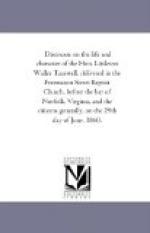younger statesmen who have since risen to eminence,
and who, like their elder colleagues, have, I am grieved
to think, nearly all passed away, were among the members,
and were engaged day after day, for three months and
a half, in performing the office which their country
had committed to their hands. The most distinguished
men of the Union,—statesmen whose own names
were historical, men of letters, merchants who remembered
that the wealth of the counting-room and the wealth
of statesmanship were indissolubly bound together,
old planters, clever young men from Virginia and from
nearly all the southern States, came to behold its
meeting, to see its members, and to hear the debates;
and, as if to invest the scene with a yet lovelier
hue, beauty, brightened by intelligence and glowing
with patriotism, shed its softened light over that
imposing spectacle. In that body, in which an
ex-president of the United States presided, in which
another ex-president was at the head of a committee,
in which the chief justice of the United States was
at the head of another committee, in which there was
no place of honor for judges, governors, ministers
to foreign courts, speakers of the House of Representatives,
and senators of the United States, above their fellow-members,
the eye of the visitor soon singled out Mr. Tazewell.
He was the grandest figure of a man among them all.
His fame was then at the height, and his large stature,
his full stern features, lighted by a wide grave blue
eye, his solemn gait, all inspiring awe as he leaned
in his seat or passed through the hall—were
in fair keeping with that intellectual image of him
which had previously existed in the mind of the beholder.
To trace with any minuteness the course of Mr. Tazewell
through more than three of the most anxious months
of his life would far exceed my present limits, and
as I have already treated this topic in a separate
work, and have been required to treat it again, I shall
simply say here, that Mr. Tazewell made the opening
speech in support of a resolution which he offered,
and which marked out the course of the campaign which
he believed to be best adapted to attain the general
end in view. Had that resolution been adopted,
I now believe, as I believed then, that a constitution
would have been formed which would have lasted for
half a century, and that Tazewell, as a skilful and
fearless mediator between the East and West, would
have performed the office with glorious success.
But the passions of men raged high; extremes were the
order of the day, and each party stood pledged to
its favorite scheme. His first regular effort
on the floor of the Convention was in reply to Mr.
Monroe, and gave him the opportunity of expounding
his theory of interests as the basis of a political
system—a system as beautiful as true.
His speech presented a fair specimen of what the discussions
on the basis question ought to have been—not
of the elaborate dissertation which lasted two days,




